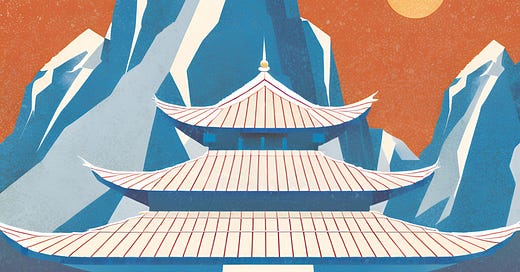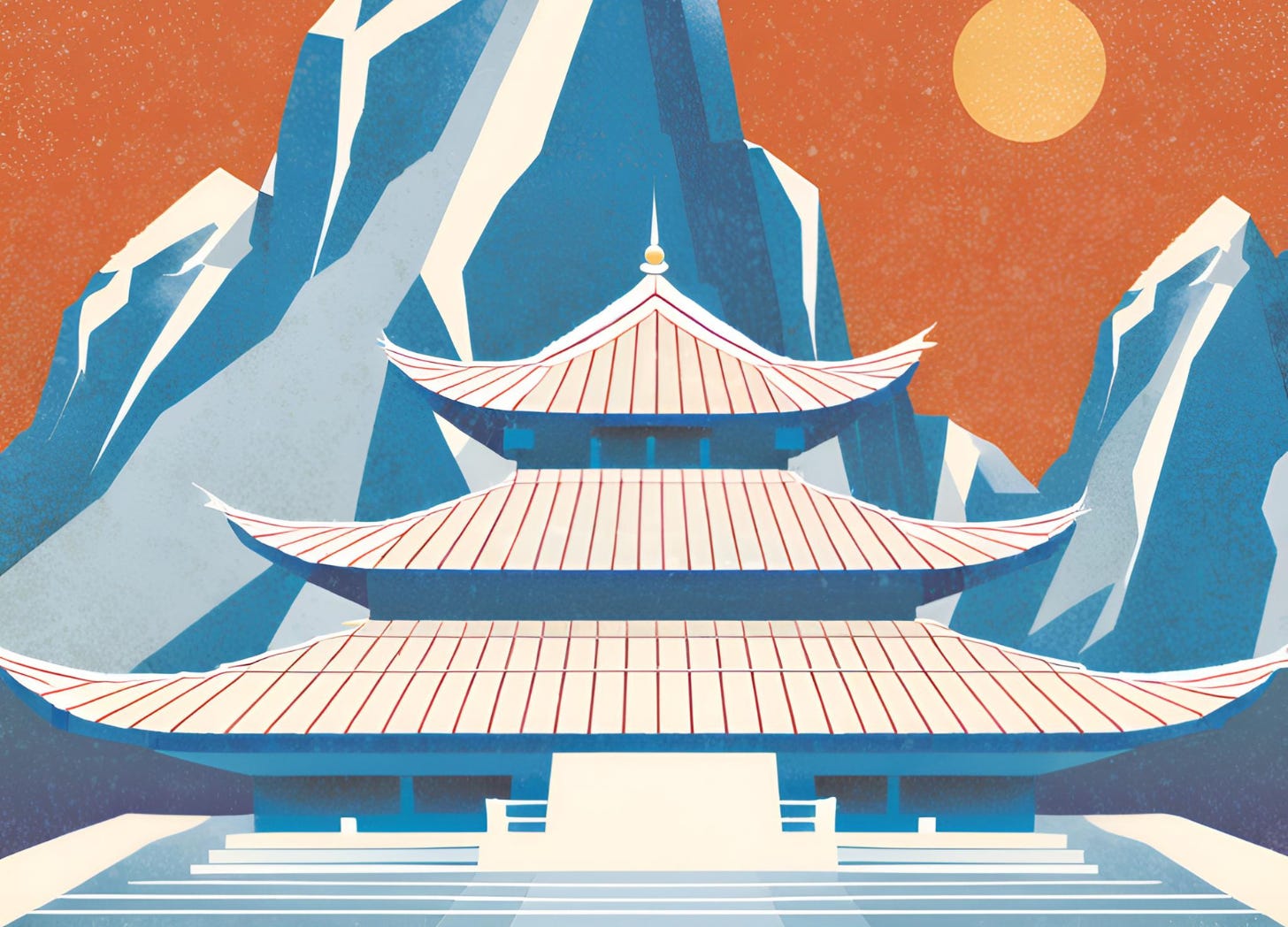CCP claim rare earths as Britain goes to the polls
...and Xi meets Putin and Erdogan, HM Government’s diplomatic juggling act with the PRC
Good afternoon everyone, the day of the General Election has arrived here in the United Kingdom (UK)... But, what’s that... All the news about Sunak and Starmer is not quite cutting it for you? Where’s Xi Jinping in the headlines, did you say? Labour, Tories, sure, but what about the CCP? I’ve got you covered:
1.1 Xi meets with Putin and Erdogan at SCO forum, Kazakhstan
Today, on 4th July 2024, Xi Jinping, General Secretary of the Chinese Communist Party (CCP), will meet Vladimir Putin, Russia’s President, and Tayyip Erdogan, Turkey’s President, at the Shanghai Cooperation Organisation (SCO) security forum in Kazakh capital Astana. It is expected that the group will discuss concerns over NATO, and Xi will discuss new arrangements for the ‘development of the [People’s Republic of] China-Kazakhstan permanent comprehensive strategic partnership.’
1.2 CCP to designate rare earths as state property
Effective 1st October, the CCP will enforce regulations designating rare earth metals as state property, ensuring Beijing’s control over their extraction, use and export. 90% of refined rare earths on the market already originate from the PRC. This move likely aims to future proof the party’s dominance in the tech and renewable energy industries, and secure the PRC’s supply chain amidst global competition.
1.3 Chinese Operating System reduces PRC reliance on Windows, Android
Huawei’s HarmonyOS, a Chinese operating system, is driving the PRC’s efforts to replace free and open countries’ operating systems such as Windows and Android. This development follows increased American sanctions, and aims to further reduce Chinese dependency on foreign technologies. The open-source version – OpenHarmony – is gaining traction in the PRC, with over 70 organisations contributing to its development.
1.4 Oslo blocks PRC from buying property on Arctic archipelago
In response to rising Chinese and Russian interest, Norway has blocked the sale of the last private property on Svalbard – a geopolitically critical Arctic archipelago located between Greenland, the North Pole, continental Europe and Russia. Oslo fears the sale to Chinese buyers of Søre Fagerfjord would threaten regional stability and Norwegian sovereignty, and its sale now requires state approval.
1.5 HM Government’s diplomatic juggle: managing the ‘special relationship’ with the US, and the PRC
If Labour wins the election, Keir Starmer faces challenges in balancing the UK’s relationships with the United States (US) and the PRC – especially if Donald Trump returns to power. The UK must choose between aligning with Trump’s protectionist policies against the PRC or pursuing its own strategy, with biotech, Electric Vehicles (EVs), and national security as key areas of focus.
1.6 Luxury British car brands fear Chinese retaliation if EV probe launched
In the wake of the European Union’s (EU) imposition of tariffs on Chinese EV brands earlier in June 2024, luxury British carmakers, including Aston Martin and Rolls-Royce, are worried about becoming collateral damage in a potential trade war with the PRC if His Majesty’s (HM) Government follows suit. While mass-market manufacturers support an investigation into the PRC’s significant state-backed subsidies, luxury brands fear that retaliatory tariffs could harm their profits in the PRC.
1.7 University of Oxford launches new centre for Chinese studies
The University of Oxford has launched a new Centre for Teaching and Learning Chinese, aimed at enhancing Chinese language education across the UK.
2.1 The Jamestown Foundation has published a report on the Chinese People’s Association for Friendship with Foreign Countries, a United Front organisation which fosters global influence through local government and NGO partnerships, often without transparency about its ties to the CCP.
2.2 Deutsche Welle TV Network has published a documentary about the system of prison labour in the PRC, which additionally explores the history of the Chinese reform through labour camps - Laogai (劳改).
2.3 An article from the British Foreign Policy Group traces fluctuations in the UK’s approach to the PRC, from Cameron’s ‘golden era’ to Truss’s hawkish stance, and details external pressures – especially from the US and evolving EU relations – that will shape the UK’s future ‘China policy’.
3.1 On the day of the General Election in the UK, we briefly look back at the Conservative government’s ‘China policy’, before summarising a potential Labour government’s approach.
The UK’s approach to the PRC under the Conservative government has been highly inconsistent as it has attempted to balance growing security concerns with economic interests. While under the leadership of David Cameron and George Osborne, the UK entered in 2015 a pollyannaish period marked by intensified economic engagement – hailed as a ‘Golden Era’. More recently, concerns over the PRC’s human rights record and the abnegation of civil rights in Hong Kong have come to shape relations. In the 2023 Integrated Review Refresh, HM Government fell short of characterising the PRC as a threat, labelling it instead an ‘epoch-defining challenge’. During their time in office, the Conservatives have sought to ‘protect, align (with allies) and engage’ with the PRC.
According to David Lammy, Labour’s would-be foreign secretary, the Conservative government’s approach to the PRC over the past 14 years has been ‘blighted by three critical failures: inconsistency, disconnection, and a lack of resources.’ If elected into power, the Labour party under Keir Starmer has promised to launch an overhaul of the UK’s ‘China policy’, conducting a full audit across Whitehall in the first 100 days of office. Lammy detailed in an April essay a foreign policy vision under Labour grounded in ‘progressive realism’, and pledges to ‘compete, challenge and co-operate’ with the PRC.
Labour’s audit is set to examine in depth critical supply chains and AI, and is reported to be overseen by Jon Garvie, Director of Geopolitics at Labour Together. Additionally, Labour ministers are expected to engage in official visits to the PRC, and harmonise Cabinet perspectives on balancing security concerns and economic ties. Despite having been discussed for over a year, the UK-PRC audit remains in its early stages, with planning and research currently underway. The full audit could take up to a year.
It is this author’s opinion that the audit should be conducted whatever the outcome of the election. This is one of the UK’s most consequential and complex bilateral relationships of this century. HM Government needs a cross-departmental team of PRC experts guiding both the UK’s grand strategy, and how the CCP’s manoeuvres affect British policy on a granular scale.
4.1 China Daily reported that David Lammy, shadow foreign secretary of the UK's Labour Party, informed Xinhua on 1st July that the UK ‘must consistently approach and engage with a country as important as China’ if Labour is elected into power on July 4th.
4.2 Beijing accuses NATO of distorting and slandering Chinese policy
On 2nd July 2024, Mao Ning (毛宁), Chinese Foreign Ministry spokeswoman rejected recent claims of Jens Stoltenberg, Secretary General of the North Atlantic Treaty Organisation, which accused the PRC of challenging NATO’s values, interests, and security, and fueling the largest armed conflict in Europe since the Second World War. In her words:
不知道北约的价值观是什么。如果是以意识形态划线,制造矛盾、挑动对抗、加剧紧张,那中国确实不能认同。事实上,是北约不断挑战中国,干涉中国内政,歪曲抹黑中国内外政策,严重挑战中国的利益和安全。对于乌克兰危机,中方始终致力于劝和促谈,推动政治解决。北约应当反思危机的根源,反思自身为欧洲和世界和平做了什么,而不是推卸责任、转嫁矛盾。
I don't know what NATO’s values are. If they draw ideological lines, create conflicts, provoke confrontations, and escalate tensions, China certainly cannot agree. In reality, NATO repeatedly challenges China, interferes in our internal affairs, distorts and vilifies our domestic and foreign policies, and severely undermines China’s interests and security. Regarding the Ukraine crisis, China remains committed to promoting peace talks and a political resolution. NATO should reflect on the root causes of the crisis and its contributions to peace in Europe and the world, instead of shirking responsibility and shifting blame.
Gray Sergeant, Research Fellow on the Indo-Pacific at the Council on Geostrategy, writes:
Tuesday (July 2nd)’s ‘Taiwan Take’ urged readers to keep an eye on Kinmen following continued China Coast Guard (CGG) incursions into the offshore islands’ ‘restricted’ waters. That evening, tensions grew when the CCG detained a nearby Taiwanese fishing vessel.
The vessel was operating outside these restricted waters, in Chinese-controlled waters, during a seasonal fishing moratorium. However, as noted by BBC News, Beijing and Taipei used to be more ‘flexible’ about each other’s fishing fleets. Therefore, the incident should be seen in the broader context of growing cross-strait tensions and CGG assertiveness in the region. As well as a new maritime regulation which widens coast guard powers to search vessels and detain their crews.
The vessels’ crew have, alongside their boat, been taken to a nearby Chinese port. Taipei has called for their release. All of which begs the questions: how long will they be held for? And are such incidents, once a rarity, about to become more commonplace?
Thank you for reading and please enjoy the election-watching responsibly, whether you’re celebrating or commiserating. That being said, this author will be referring to the poetry of Li Bai 李白 (701-762): [將進酒] ‘Bring in the wine’ for electoral inspiration.
鐘鼓饌玉不足貴,但願長醉不復醒。
Bells, drums, delicacies and jade are not fine enough for me,
Oh, how I wish to be drunk and never sober again.
Check back in next week for more China-related news and views!
- Liddy
If you would like to explore any of the Council on Geostrategy’s PRC-focused research papers, click here to visit the China Observatory.










Very interesting
[para 2.2] Laogai 劳改 is not re-education through labour. That is (or was) laojiao 劳教, a lesser punishment not requiring a court sentence and limited to 3 years. Laogai is reform through labour, with its echos of Arbeit macht frei.